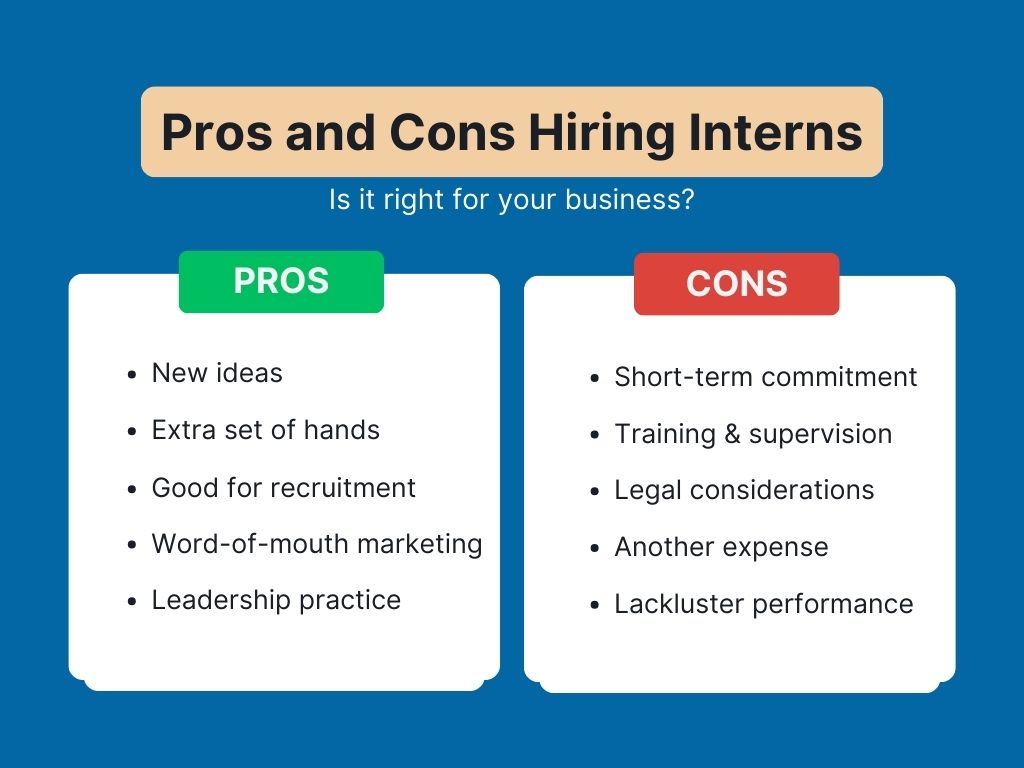
Thinking about hiring interns for your small business? Our step-by-step guide will walk you through the process and tell you everything you need to know.
I cruised down the snowy hill and felt the wind dance over my cheeks. As I picked up speed I adjusted the back leg of my snowboard.
Then promptly caught an edge and faceplanted. This happened so many times that day, I began to worry about frostbite.
Attempting to snowboard without at least a clue of how to do it was a bad idea. The same goes for hiring interns for your small business.
With labor laws to consider and the temporary nature of internships, going in blind can be detrimental for business owners. You need to know the upsides and downsides, how to go about the process, and how to ensure it’s a win-win for your interns and your company.
Which is why we’ve put together this guide on hiring interns for your small business. We’ll walk you through everything you need to know to keep the process as smooth and painless as possible.
Disclosure: Our website participates in various affiliate marketing programs, which means we may earn a commission on purchases made through our affiliate links. We only promote products and services that we believe offer value to small business owners. The following information is not legal advice. Be sure to speak with a local attorney before making any legal decisions.
What is an internship?
First things first, let’s talk about what an internship is. An internship is a period of work experience a company offers, often to a student or recent graduate, who wants to gain practical experience in a particular field.
Internships can be paid, unpaid, or even done for college credit. They can also vary in length from a few weeks to several months.
They provide interns with the opportunity to apply their knowledge and skills in a real-life work setting while also giving them valuable insight into the industry.
They’re common in industries such as finance, marketing, and technology, but can also be found in fields like education, healthcare, and even photography.
The typical idea of an intern might be a young college kid spending his summer making copies and getting coffee at a big firm. However, many small businesses offer internships as well.

Pros of hiring interns for your small business
An internship program might sound great for the intern, but as a small business owner, you’ll get a lot out of the experience too. Here are some of the upsides of hiring interns for your small business.
New ideas
The first benefit of hiring interns is they bring fresh perspectives and new ideas to your business. They may have knowledge or skills in an area you haven’t explored yet, or they may see things from a different angle.
This can be especially beneficial for small businesses as they often have limited resources and manpower. Interns can help inject creativity and innovation into your company.
Extra sets of hands
Small businesses often have a lot of work but not enough hands to do it all. That’s where interns come in. They can assist with day-to-day tasks, freeing up time for you and your employees to focus on more important projects.
Interns can also take on special projects sitting on the back burner due to lack of time or resources.
Good for recruitment
Internships can also serve as a trial period for potential future employees. You get the opportunity to see how they work and if they would be a good fit for your company in the long term.
This can save you time and resources in the hiring process, as you’ll already have a pool of qualified candidates who are familiar with your business.
Word-of-mouth marketing
Interns can also serve as ambassadors for your business. By providing them with a positive and fulfilling experience, they’re more likely to spread the word about your company and potentially bring in new customers or clients.
This can be an added benefit for small businesses that don’t have a large marketing budget.
Leadership practice
Lastly, hiring interns allows your other employees to practice their leadership skills. Without other employees, they may not have many opportunities to manage and mentor a team.
Interns provide a low-risk environment for everyone to hone their leadership skills and help prepare them for managing full-time employees in the future.
Cons of hiring interns for your small business
Of course, there are also some downsides to hiring interns for your small business you should be aware of.
Short-term commitment
Unlike full-time employees, interns are only committed to your company for a short period. This means they may not have the same level of loyalty or investment in your business as other employees.
It’s important to be upfront during the hiring process and look for interns who’ll do their best despite the temporary nature of their internship.
Training and supervision
Interns may also require more training and supervision compared to other employees, as they’re new to the industry and may not have as much experience. This can take up valuable time for you or your team members.
It’s important to have a clear plan in place for how interns will be trained and supervised to ensure they get up to speed as quickly as possible.
Legal considerations
Hiring interns also comes with legal considerations, such as adhering to labor laws and ensuring your interns receive a valuable learning experience in exchange for their work. It’s important to do your research and follow all necessary regulations.
Another expense
While interns may not require a salary, there are still costs associated with hiring and hosting them. This includes providing necessary equipment or resources and potentially offering compensation for transportation or housing.
It’s important to budget for these expenses before bringing on interns to avoid any financial strain on your business.
Lackluster performance
Like any employee, there is a chance an intern may not meet your expectations or may not be the right fit for your business. This can lead to wasted time and resources.
To avoid this, have clear expectations and communicate openly with your interns throughout their internship.

Step-By-Step Guide for Hiring Interns for Your Small Business
Now let’s cover how to go about hiring the best interns for your small business. We can’t promise a foolproof process, but follow these steps and you’ll be well on your way to finding the right interns for your organization.
Step 1: Define Your Needs
Before you search for a new intern, it’s important to define exactly what you need from them. How are they going to help your business? What areas will they impact?
How will you gauge whether the internship has a positive effect on your business?
Answering these questions ahead of time will help you set up your program to be as effective as possible.
Step 2: Map out your internship program
Once you have a clear idea of what you want from your interns, it’s important to map out the structure of the internship program. This includes outlining tasks and responsibilities, setting goals and expectations, and determining how long the internship will last.
A well-structured program will ensure both you and your interns get the most out of the experience.
Step 3: Decide who you want to hire
With a well-defined internship program, you can now create a profile of your ideal intern. This should include qualities such as desired skills and experience, personality traits, and specific qualifications.
Keep in mind an internship is meant to help interns learn and grow, so look for individuals who are motivated and eager to take on new challenges.
Step 4: Create an evaluation method
To ensure your internship program is successful, it’s important to have a way to evaluate the performance of your interns. This can include setting specific goals and objectives, conducting regular check-ins and evaluations, and providing feedback throughout the internship.
With an evaluation method in place, you can track progress and adjust as needed.
Step 5: Plan out the interview process
Next, you need to plan out the interview process. This can include phone or video interviews and in-person interviews for top candidates.
Be sure to ask relevant questions that will help you determine if the candidate is a good fit for your business and internship program.
Step 6: Build a training program
As mentioned earlier, interns may require more training and supervision compared to other employees. It’s important to have a structured training program in place to ensure they’re equipped with the necessary skills and knowledge for their role.
Be clear on expectations and provide resources for them to learn and grow during their internship.
Step 7: Stay on top of labor laws regarding interns
While building your internship program, it’s important to stay informed and up-to-date on labor laws and regulations around hiring interns. This includes minimum wage requirements, hours of work, and ensuring the internship provides a valuable learning experience for the intern.
The Fair Labor Standards Act governs the use of unpaid interns in for-profit businesses. It pays to familiarize yourself with these laws before you start hiring.
Step 8: Start recruiting
Now that you have everything in place, it’s time to start recruiting for your internship program.
Networking events, job fairs, and university career centers are all great places to find potential interns. You can also use online job platforms and social media to reach a wider audience.
Related Posts:
- 12 Secrets to Small Business Employee Motivation Every Boss Should Know
- Want More Sales? Try These 15 Strategies for Getting More Customers
- 14 Options for Business Capital Funding: How to Get Funding for Your Small Business

How to Find a Rockstar Intern
Setting up an internship program is a great beginning, but it won’t do you any good if you don’t have interns signing up for it. And since you’re a small business, many students might not know you even offer one.
You’ll have to advertise your internship program to help get the applications coming in. And the more applications you have to choose from, the better chance you’ll find a rockstar intern that helps your business grow.
Here are a few places to start:
Team up with the local college or university
Reach out to local colleges and universities, particularly those with programs relevant to your business. They may have career centers that can help you advertise your internship program to students.
Or, consider collaborating with professors or departments to offer internships for college credit.
Ask your employees for referrals
Your current employees may know students in their network who would be interested in interning at your business. Encourage them to share the opportunity with their peers and colleagues.
You could even start a referral program for your interns. When they refer someone who gets hired, they receive a bonus or other incentive.
Harness the power of social media
Use social media platforms to spread the word about your internship program. This can include sharing posts about the program, highlighting past interns’ experiences, and using relevant hashtags to reach potential candidates.
Attend job fairs or networking events
Participating in job fairs and networking events is a great way to meet and connect with students who may be interested in internships. Be prepared to talk about your business and the opportunities you offer for interns.
Post on online job boards
Another good option is to post on online job platforms such as LinkedIn, Indeed, and Glassdoor to advertise your internship program. These sites have a large pool of potential candidates and allow you to target specific demographics.
Your job posting will also reach an audience of job seekers who may not have considered interning but would be interested in the opportunity.

How to Get the Most Out of Hiring Interns for Your Small Business
Like anyone you hire, there is a potential for things to go great and for things to be a big waste of time and money. Here are some do’s and don’ts to ensure your internship program is a win-win for everyone.
Do’s:
- Assign specific tasks and projects for interns to work on.
- Provide clear instructions and expectations.
- Offer guidance and mentorship throughout the internship.
- Give feedback regularly and recognize their achievements.
- Include interns in meetings, brainstorming sessions, and other company events.
- Consider offering a stipend or other form of compensation for their time and efforts.
- Keep your expectations realistic for their experience and skill level.
Don’ts:
- Treat interns as free labor or give them menial tasks.
- Neglect to provide proper training and resources.
- Expect interns to work long hours without pay or breaks.
- Dismiss their ideas or contributions without consideration.
- Exclude them from important company events and activities.
- Overwhelm them with too many projects or tasks.
FAQ’s About Hiring Interns for Your Small Business
Here are some common questions about hiring interns for your small business.
Are internships part-time or full-time roles?
They can be both part-time and full-time. It depends on what you want from your internship program. You’ll also want to consider your business needs and the intern’s availability.
How long should an internship last?
Internships typically last anywhere from 3 to 6 months, but can also be shorter or longer depending on the needs of your business and the intern’s schedule.
Do interns have to be paid?
It depends on the internship and your business location. In some cases, unpaid internships are allowed if they are for educational purposes and do not benefit the employer. However, checking your local laws and regulations is important to ensure compliance.

What is the difference between unpaid and paid internships besides salary?
Paid internships are considered to be employment, and therefore, interns are entitled to the same labor laws and benefits as regular employees. Unpaid internships are for educational purposes and do not involve traditional employment tasks or responsibilities.
What makes an internship program good?
A good internship program offers meaningful work experience, mentorship opportunities, and the chance to learn new skills. It also provides a positive and inclusive work environment for interns to thrive in.
Can startups hire interns?
Yes, startups can also hire interns. It can be a great way for startups to get additional help while providing valuable learning experiences for students.
However, as a startup, you’ll want to ensure you have the resources and capacity to properly train and support your interns.
Are interns worth it for employers?
Hiring interns can be beneficial for employers in many ways. They bring fresh perspectives and ideas to the table, provide an extra hand during busy periods, and can even become potential full-time employees after their internship ends.
Moreover, offering internships can also improve your company’s reputation and help attract top talent in the future.
At the end of the day though, you’ll be the best judge on whether hiring an intern will help or hurt your business at its current stage.
Final Thoughts on Hiring Interns for Your Small Business
We hope this guide on hiring interns for your small business has given you the confidence you need to move forward with this next step in your business. If you follow the steps outlined above, you’ll be on your way to finding and hiring great interns who can help your business grow.
You’ll also save yourself from the business version of faceplanting in the snow for hours on end.
Want to learn more secrets and strategies for growing your dream business? Sign up for our newsletter! Every week we’ll send our best tips, tools, and resources straight to your inbox.

How to Get More Customers to Your Business: 15 Smart Strategies
Looking to help your business grow and thrive? Check out these 15 strategies for how to get more customers to your business. Read more.

12 Secrets to Small Business Employee Motivation Every Boss Should Know
Want productive, happy employees who are excited to come to work and perform well? Then learn the 12 secrets to small business employee motivation. Read more.

Why Digital Marketing is Important for Small Business: What You Need to Know
Trying to grow your business and make more sales? Learn why digital marketing is important for small businesses and how to get started. Read more.
